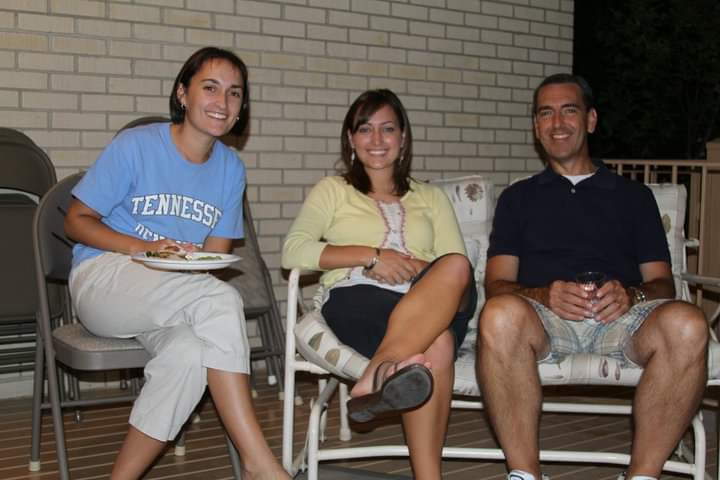My 33-year-old daughter Christina Elizabeth Bohn died from suicide due to having Premenstrual Dysphoric Disorder (PMDD) on November 3, 2021. This disorder made her want to die almost every month. It wasn’t always so bad that she wanted to die every month; rather, it became worse for her the longer she went undiagnosed and untreated.
Christina graduated as valedictorian from her university’s nursing school in 2010—three years before PMDD would be listed in the DSM-5—so PMDD was not yet in the curriculum. She had no idea there was something far worse than Premenstrual Syndrome (PMS). She sought help for 11 years for depression and anxiety. As we’ve tried to piece together when PMDD may have started in her life, we think she may have suffered for as long as 15 years. She could effectively mask her symptoms for most of those years, and she could still work as a thoracic ICU nurse, take good care of her two children, hold positions in her church, and plan vacations and parties. She did very well until she couldn’t keep it up any longer. Very few people knew hidden deep inside our cheerful Christina was a darkness and hopelessness that couldn’t stay hidden forever. The mask slipped off in the last year and a half of her life. Looking back, we believe COVID had a role in the unmasking of her symptoms.

“My PMS is lasting two weeks.” My daughter told me this a few years ago. I didn’t know what she meant by that. Just like Christina, I didn’t know there was something far worse than PMS. Why didn’t we think to Google “My period is lasting two weeks”? Maybe an article would have come up about PMDD.
We lived five hours apart, and even though we saw each other often, she wasn’t letting on that she was suffering. Maybe she wasn’t expecting her period during the times we were together. I hadn’t noticed she was self-isolating for a week or two before her period started. As close as we were, we didn’t talk on the phone every day, and texting seemed to work for the occasional messages or cute photos of the kids. How did we let so much time go between talking on the phone? I was working full time, and she had her own busy life.
So many symptoms. Christina didn’t know the many other symptoms she was experiencing were typical of PMDD. Maybe because some of those symptoms started two weeks ahead of her period, she didn’t realize they were related to her menstrual cycle—we say she didn’t know they all belonged in the same “PMDD basket.” Later, we realized Christina was dividing her symptoms among her healthcare providers. She saw psychiatrists and therapists for depression, anxiety, and panic attacks. She saw a gynecologist for her menstrual discomfort. She saw a family doctor for managing her migraine headaches. She saw a chiropractor and frequently got massages for her aches and pains. With her volunteer work, she dealt with some difficult situations, and her nursing skills and experience proved helpful when she was dealing with other people’s problems. She often attributed her depression, anxiety, and other symptoms to serving others who had severe issues. It’s easy to reason away symptoms when life is busy.
Missed lightbulb moment. Christina’s missed lightbulb moment happened when she went to an ER due to feeling suicidal on her birthday, October 2, 2020. She was admitted and spent the night in the behavioral health unit. The next morning, she told the nurse practitioner she was feeling better and that she had started her period in the night. This could have been THE lightbulb moment that could have saved Christina, but instead it was missed. Christina was diagnosed with treatment resistant depression since the nurse practitioner had reviewed Christina’s records and saw all the prescriptions and therapies Christina tried over the years. The nurse practitioner then recommended 12 sessions of electroconvulsive therapy (ECT) over a month’s time, and she wanted Christina to have her first session before leaving the hospital. We don’t blame the nurse practitioner or Christina—obviously, neither of them knew about PMDD.
I begged Christina not to do the ECT, but Christina was compliant and desperate. She often called me during the month to tell me the ECT was not working. She was weepy and tired. She felt her brain was fried. She then sent a text asking if she could come home to us to recover for two and a half weeks after she finished the ECT sessions. Of course. Why did we text instead of talkng on the phone? When she arrived at our home on October 31, 2020, she practically fell into the house. She didn’t know how she managed to drive the five hours from her home to our home. We should have driven to her to pick her up. We wish we had known she shouldn’t have been driving.
In the two and half weeks Christina was planning to stay with us, we treated her with lots of love and provided her with as much comfort and affection as we possibly could. Her symptoms increased and intensified (a sad story we don’t share), and she never returned home to her husband and children. Over the next nine months, she stayed in a behavioral health unit for over 100 days cumulatively. No one recognized she had PMDD. No one asked about her menstrual cycle. No one charted when her periods started. Perhaps no one treating her knew about PMDD.

After nine months, on July 16, 2021, we returned Christina to the hospital because she had become delusional. As usual, we all cried as we said goodbye in the ER. (I could write another story about those days in the hospital.) As I lay my head on my pillow that night, a thought came to my mind, “Look up menstrual psychosis,”—a term I had never heard before. I did a search, and articles came up about PMDD. One article was about 17 women who had gone undiagnosed and untreated for a long time. I could hear Christina’s voice as I read their quotes. She had said many of the same things.
I could hardly wait for the sun to come up so I could contact Christina’s inpatient psychiatrist. He was thrilled, especially when I was able to prove it was PMDD by making a grid listing all the admission dates, the reasons for admission (suicide attempts or delusions), and the dates her periods started (we had her phone with her period tracking app, which she always updated). Her periods started within hours, a day, two days, or three days after the attempts or delusions. We all felt the sun was finally shining in the dark tunnel we had been in with Christina for the previous nine months.
I asked Christina what would have helped her, and she said if any of the ER doctors or nurses had known about PMDD and had asked three questions, she might have been diagnosed years ago:
- When was your last period?
- When are you expecting your next period?
- What is PMS like for you?
She emphasized it was important to keep those questions simple because she was in distress when she was in the ER. She said to ask about PMS because she believed her mind wouldn’t have comprehended questions about PMDD at the time. A doctor or nurse could have then asked if she were experiencing other symptoms, which she wouldn’t have known belonged in that “PMDD basket.” They could have then explained there is something worse than PMS called PMDD. We call her questions “Christina’s Questions,” and we hope doctors and nurses will always remember there was a young mother named Christina who might still be alive had she been asked those questions.
Christina paid the price for lack of awareness and perhaps a stigma about menstrual cycles, which may have kept doctors from asking her about her cycle.
PMDD is the great liar and thief. Because no one recognized Christina had PMDD, she lost valuable time in treating it. PMDD lied to her every month telling her she was worthless and incapable of living life. It then stole everything from her—her marriage, her children, her career—the life she worked so hard for and so dearly loved. We and her children feel robbed, too, as we grieve for her every day of our lives. There are substories within this story that will have to wait for another day …
When Christina’s body was found on November 3, 2021, we knew we had to talk about PMDD. We knew there were three stigmas—suicide, mental illness, and menstrual cycles—but we had to talk anyway. We have had amazing opportunities to share about PMDD. We’ve joined hands with the International Association for Premenstrual Disorders (IAPMD)—an incredible organization, which provides education, support, and resources for those with PMDD, families, and healthcare professionals. (Visit IAPMD.org)
In the 2023 legislative session in the State of Missouri, we passed the nation’s first PMDD Awareness Day, which is on Christina’s birthday, October 2nd. We had an event at the Missouri State Capitol for the first PMDD Awareness Day.
This year, we had the first Christina Bohn Memorial 5K for PMDD Awareness on Saturday, September 28, in Columbia, Missouri. We were proud to announce it was Trail Sisters Approved. We had a good turnout for the inaugural 5K. Women came from 18 states and two foreign countries to be part of the event.

We hope by adding our voices to the conversation, others will know about PMDD, recognize it in themselves or in their loved ones, and will love and support each other rather than react to the negative symptoms of PMDD. Keep living. Keep going. Remember … there is hope, and there is help.
















11 Responses
So sorry for your loss, Marybeth.
Thank you. It’s a loss we will never get over. Christina was lovely–a person with so many gifts and had such a delightful personality. PMDD stole everything from her. PMDD is a spectrum disorder that can become worse the longer it goes undiagnosed and untreated. Hopefully by shining a light on PMDD, we will have contributed toward someone’s getting diagnosed and helped sooner.
I’m so sorry for your loss Marybeth. I have PMDD and I’m fortunate that we were able to figure out that’s what it was. Holding your daughter’s story in my heart.
Hi Stephanie, thank you for your message and for your condolences. I’m so glad you were able to figure out you had PMDD earlier than later. It is a challenge to deal with no matter what though. I hope you’re doing well with your treatment options, and I hope you’ll be able to join us next year at the Christina Bohn Memorial 5K for PMDD Awareness. We scheduled it on Saturday, September 27, 2025. We still need to see if it conflicts with MU football games, so there’s a chance it might be rescheduled, but the football schedules over the past three or four years have had away games on the last Saturdays of September.
Thank you so much for sharing your story, I can’t imagine how hard it is to do that. I wanted you to know that I resonated with this story and appreciate you spreading this message. I have suffered from PMDD since my late high school years, and I’m 37. Masking symptoms, constantly misdiagnosed or ignored when desperately reaching out for help, attempts, hospitalizations, medications & treatments that never worked…it’s a mirror for my experience as well. I always knew intuitively there was something more, I just didn’t know what or how to find someone that wouldn’t just shrug it off as “crazy woman stuff”. I only found out about the existence of PMDD maybe a couple years ago, and I had to put the pieces together MYSELF for myself, not with any support from doctors. I didn’t realize the IAPMD existed either, that’s amazing! So thank you for all you do bringing awareness to this invisible monster. I hope the medical field will become more aware, validating, and supportive of this disorder, and more women can get the help they need to manage it. Sending you and your family healing, love and gratitude.
Hi Cory, thank you for your message. I can see how Christina’s story resonated with you–truly a mirror of your own. You described PMDD so well, ” … this invisible monster.”
We had a get-together at our home in the evening after the 5K last September. Thirty women were there sharing their stories. We had women from 18 states and two countries at the 5K, and many of them came to our home that evening. I hope you will be able to come next year–Sept. 27, 2025, and be part of this amazing group of women.
I wish Christina were here to meet you and many others who have PMDD, but I’m sure she’s watching over all of us.
Thanks you for sharing this story. I have always had very emotional week pre-period where I felt completely derailed, but then overnight, a flip would switch and I was back to my “right mind.”
When I got married in 2016, I got on birth control and it felt like everything got 10x worse. I didn’t tell anyone, but I was daily dreaming of driving off the road on my way home from work. I stopped wearing my seatbelt. I just wanted to quit. When I was finally able to tell my husband how bad things were, neither of us fully understood what was going on. I described the experience as if I was a rag doll, being whipped around by a toddler. I had no control and the emotional whiplash was exhausting. We started referring to those “crazy weeks” as if I was being taken over by different person who we nicknamed “Helga.” I would wake up and feel off, but could warn my husband/ask for help by saying “Helga’s back” which gave a lighter tone to the situation so I wouldn’t immediately panic, and signaled to him that I needed extra support that day.
We started to think the birth control was making it worse, but, at the time, insurance wouldn’t cover me taking my IUD out and getting on something else (and kids weren’t an option then). Long story short, I suffered for years until I found a naturopath who told me about PMDD. She helped me advocate for myself and get on a new birth control and helped me find the right supplements. I also started seeing a therapist who taught me self-regulation tactics and encouraged me to get on anxiety meds. It took years to get her, but my PMS is finally at normal levels and I have tactics and support around me when it does get dicey.
I’m so thankful that you are talking about this. When I first ready about PMDD, I started crying because I found a name for the chaos in my head. I felt seen. I hope more women have that experience reading this story and can get support.
Hi Varina. Going through this right now with my 17 year old daughter. She starts the Loryna birth control pill this sunday and I am hoping it helps her deal with the extreme mood swings she has been experiencing since January. Loryna is estrogen and progesterone combo and doctor said typically is what is prescribed for PMDD. If you don’t mind me asking what birth control are you on that helped? as well as what supplements do you take? I had read fish oil is, magnesium, calcium and vitamin b are supposed to be helpful?? Thank you for sharing your story.
Hi Varina, Thank you for sharing your story. Each story is unique and yet each story has common threads that other women are nodding their heads vigorously saying, “That’s me! that’s me!”
You answer so much before knowing what you really had. Then once you find out what you really have, you go through more to figure out what works. What a blessing to have a supportive spouse who understands. It makes a huge difference.
May God bless you. Please keep in touch. We just received 501c3 status for the Christina Bohn Foundation. That we can’t stand the thought of other suffering like Christina did and like you did/do. Advocacy work is so important. I shared the name of our foundation so you can keep up with us. We will also seek Trail Sisters approval for the second annual Christina Bohn Memorial 5K for PMDD Awareness, which will be on September 27th, 2025, in Columbia, Missouri.
Sending love and hugs.
just stumbled across this googling PMDD. I just took my 17 year old daughter to the Gyne last week because she has been suffering since January with what I felt was PMDD. Best way to describe what she toes through is like she is temporarily bipolar for 7-10 days then returns back to her normal self. It wears her out both mentally and physically though and is very hard to watch as a parent. She will start Loryna birth control this weekend and I am so hoping it helps her. She is isolative, cries alot, feels hopeless, has increased anxiety, extreme irritability, irrational thinking etc, sometimes all within the same day. I know she is frustrated and tells me she just wants her old life back. GYNE felt it was PMDD also, luckily I had documented her severe mood swings starting in January and saw a pattern of when they occur and how long they last. Thank you for sharing your story, hopefully it will help others!
Thank you for sharing about your daughter. What you did to document what you witnessed happening with your daughter was spot on. You are a wonderful mom, and your daughter will need you to support and guide her on this journey. Sending my very best wishes for both of you. 🩷